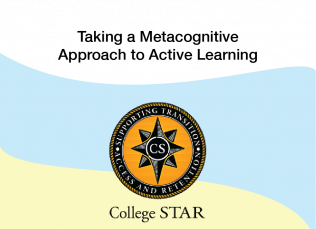
Taking a Metacognitive Approach to Active Learning
Taking a metacognitive approach can help faculty prepare students to make the most of active learning experiences while helping them become self-directed learners (Pelley, 2014). This module will focus on strategies and approaches instructors can take to become more metacognitive in their own professional practice and in the classroom.
This resource was originally developed with resources from the College STAR grant. That grant has ended and the College STAR modules will now permanently reside at the East Carolina University Office for Faculty Excellence.
Module Introduction
Although existing research documents the impact of active learning (Ambrose et al., 2010; Bonwell and Eison, 1991), the focus is often on collecting and implementing techniques. While it is tempting to “plug and play,” to be effective, active learning needs to be examined in the larger context of student learning (Weimer, 2018). Taking a metacognitive approach—choosing forms of active learning that foster metacognition—can help faculty prepare students to make the most of active learning experiences while helping them become self-directed learners (Pelley, 2014). This module will focus on strategies and approaches instructors can take to become more metacognitive in their own professional practice and to use metacognition as they design and implement active learning in their classes.
Support for this Module
Original development of this module was made possible by the College STAR (Supporting Transition Access and Retention) initiative. College STAR was a grant-funded project focused on partnering postsecondary educational professionals and students to learn ways for helping postsecondary campuses become more welcoming of students with learning and attention differences. Much of this work was made possible by generous funding from the Oak Foundation.
Organization/Publishers:
Share this resource:
Posted date:
November 11, 2022



